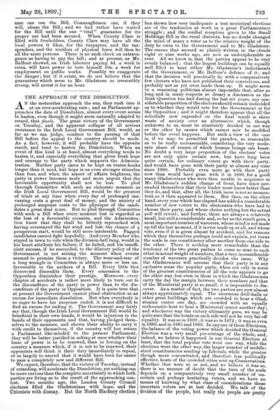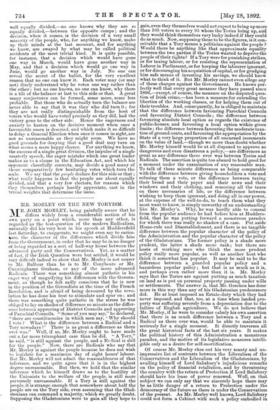THE APPROACH OF THE DISSOLUTION.
AS the meteorites approach the sun, they rush into it at an ever-accelerating rate ; and as Parliament ap- proaches the date of Dissolution, almost every event seems to hasten, even though it might seem naturally adapted to retard, that finale. The great victory of the Government on Tuesday, and the apparent collapse of all serious resistance to the Irish Local Government Bill, would, as far as we can judge, conduce to the passing of that Bill before the appeal to the country should be made. As a fact, however, it will probably have the opposite result, and tend to hasten the Dissolution. When an event of this kind is at hand, almost everything tends to hasten it, and especially everything that gives fresh hope and courage to the party which supports the Adminis- tration. Neither party cares to be kept on tenter-hooks longer than it need, but hope is an even stronger stimulus than fear, and when the aspect of affairs brightens, the party in power becomes more and more urgent that the favourable opportunity shall not be lost. To plod through Committee with such an elaborate measure as the Irish Local Government Bill, would be the greatest of trials at any time when every day of prolonged can- vassing costs a great deal of money, and the anxiety of prolonged suspense costs to the physique of the candi- dates a great deal n:ore. But to plod through Committee with such a Bill when every moment lost is regarded as the loss of a favourable occasion, and the Administra- tion know that they shall be bitterly reproached with having overstayed the fair wind and lost the chance of a prosperous start, would be still more intolerable. Fagged candidates cannot fight hopefully. And every Member who stayed in town to vote when the division-bell rang, would in his heart attribute his failure, if he failed, and his insuffi- cient success, if he succeeded, to the dilatory policy of the Government in hot seizing the moment when events seemed to promise them a victory. The wear-and-tear of a long wrangle in Committee is always more or less un- favourable to the authors of a Bill. Every little blot discovered discredits them. Every concession to the Opposition diminishes their prestige. Moreover, every chapter of accidents is rather more likely to turn out to the discomfiture of the party in power than to the dis- comfiture of the party in Opposition. It is quite true that at present the Government cannot plead obstruction as an excuse for immediate dissolution. But when everybody is so eager to have his suspense ended, it is not difficult to find an excuse for ending it. The Government may fairly say that, though the Irish Local Government Bill would be beneficial in their own hands, it would be injurious in the hands of their opponents, and that, having pledged them- selves to the measure, and shown their ability to carry it with credit to themselves, if the country will but return a Parliament like-minded to the present Parliament, they will be better justified in asking at once whether their lease of power is to be renewed, than in forcing on the country a measure which, if it is not to be renewed, their opponents will think it their duty immediately to repeal, or so largely to amend that it would have been far easier to pass a completely new and different Bill. We expect, therefore, that the victory of Tuesday, instead of retarding, will accelerate the Dissolution; yet nothing can be more curious than the complete uncertainty in which both parties are living as to the result of the approaching con- test. Two months ago, the London County Council elections filled the Gladstonians with hope, and the Unionists with dismay. But the North Hackney election has shown how very inadequate a test municipal elections are of the tendencies at work in a great Parliamentary struggle ; and the cordial reception given to the Small Holdings Bill in the rural districts, has no doubt changed the mind of many a voter as to the relative weight of the duty he owes to the Government and to Mr. Gladstone. The omens that seemed so plainly written in the clouds eight or nine weeks ago, are now as undecipherable as ever. All we know is, that the parties appear to be very evenly balanced ; that the hugest buildings can be equally well filled to hear either Mr. Gladstone's indictments of the Government, or Mr. Balfour's defence of it ; and that the decision will practically lie with a comparatively few electors who have not published their convictions, and probably not as yet even made them up. It might seem to a reasoning politician almost impossible that, after so long and in many respects so dreary a discussion as the Irish Question has had during the last six years, any con- siderable proportion of the electors should remain undecided as to whether they would vote for the Government or for the Opposition ; and it might therefore appear that all the solicitude now expended on the final result is sheer waste of anxiety over an alternative which, though unknown to us, must be absolutely decided in one way or the other by causes which cannot now be modified before the event happens. But such a view of the case is, if we may be permitted the paradox, so reasonable as to be really unreasonable, considering the very mode- rate share of reason of which human beings can boast. No doubt a very large proportion of the electors' votes are not only quite certain now, but have long been quite certain, for ordinary voters go with their party, and would have gone with their party at almost any time since 1886. Probably even more go with their party now than would have gone with it in 1886, for a good many Gladstonians who were then unable to acquiesce in Mr. Gladstone's sudden change of front, have since per- suaded themselves that their leader must know better than they do, and that, after all, the Irish issue is not so momen- tous as it then appeared to them. But then, on the other hand, every year which has elapsed has added a considerable number of new voters to the electorates who have had to choose their party, and whose choice nothing but the actual poll will reveal ; and further, there are always a relatively small, but still a considerable and, so far as the result goes, a most important number of waverers, whose mind is not made up till the last moment, if it is ever made up at all, and whose vote, even if it is given almost by accident, and for reasons which they themselves perhaps could not explain, yet turns the scale in one constituency after another from one side to the other. There is nothing more remarkable than the tendency of the two great parties to come so near to each other in actual weight of numbers, that a very inconsiderable number of waverers practically decides the issue. Why the Gladstonians will assume that their party is in any exclusive sense the popular party, when not only in some of the greatest constituencies of all the vote appears to go the other way, but even in those in which the Gladstonians carry the day the margin between their numbers and that of the Ministerial party is so small, it is impossible to dis- cover. As a matter of fact, the two parties are now almost always approximately equal. The enormous drill-halls or other great buildings which are crowded to hear a Glad- stonian orator one day, are crowded with an equally enthusiastic host to hear a Ministerial orator another day ; and whichever way the victory ultimately goes, we may be quite sure that the totals on each side will not be very far off equality. It was so in 1869; it was so in 1874; it was so even in 1880, and in 1885 and 1886. In anyone of these Elections, the balance of the voting power which decided the General Election was a very small per-centage of the whole, and, indeed, we believe it happened in one General Election at least, that the total popular vote went one way, while the elections went the other way, the larger number of middle- sized constituencies sending up Liberals, while the greater though more concentrated, and therefore less politically effective, hosts of the crowded cities sent up Conservatives. Whether that were so or not, and we believe it was so, there is no manner of doubt that the turn of the scale depends on a comparatively very small number of un- certain and perhaps hesitating voters, and we have no means of knowing by what class of considerations those uncertain voters are at last decided. We talk of the
decision of the people, but really the people are pretty
well equally divided,—no one knows why they are so equally divided,—between the opposite camps ; and the decision, when it comes, is the decision of a very small minority of the people, who, for anything we know, make up their minds at the last moment, and for anything • we know, are swayed by what may be called political accidents of the most trivial kind. It is quite possible, for instance, that a decision which would have gone one way in March, would have gone another way in May, and that a decision which would go one way in June, would go another way in July. No one can reveal the secret of the ballot, for the very excellent reason that no one can know it. Each voter may (or may not) dimly understand why he votes one way rather than the other ; but no one knows, no one can know, why there is a tilt of the balance at last to this side or that. A great many conjectures can be formed, some more, some less probable. But those who do actually turn the balance are never able to say that it was they who did turn it ; for they are not really distinguishable from the host of voters who would have voted precisely as they did, had the victory gone to the other side. Hence the eagerness and anxiety to hasten on the decisive moment when once a favourable omen is descried, and which make it so difficult to delay a General Election when once it comes in sight, are not so unreasonable as they might seem. We have no good grounds for denying that a good deal may turn on what seems a mere happy chance. For anything we know, the success of a single great division, the impulse of a single masterly speech, the eager mistake which one great leader makes as to a clause in the Education Act, and which his opponent cheerfully corrects, may decide a good many of those comparatively few hesitating votes which turn the scale. We say that the people declare for this side or that ; what really happens is that the people are about equally divided, and that a very few electors, for reasons which they themselves perhaps hardly appreciate, cast in the trivial weights that determine the issue.







































 Previous page
Previous page